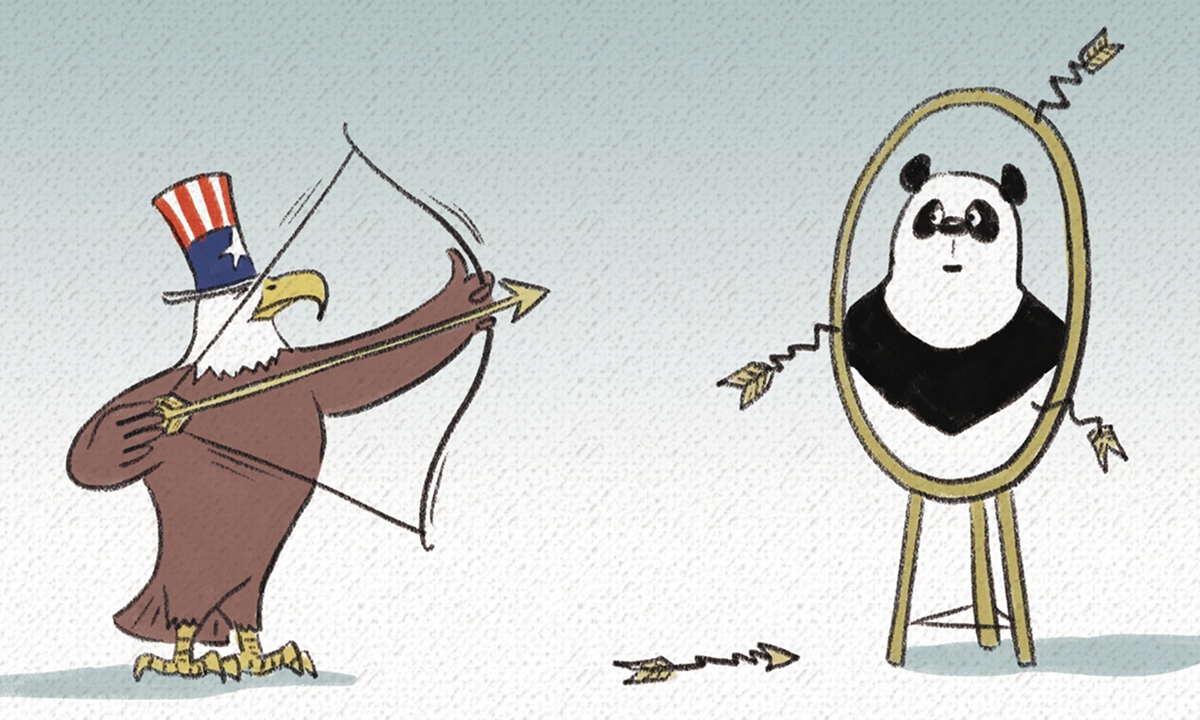
Illustration: Liu Rui/GT
Recently, two renowned strategists sounded the alarm bell about the US strategy toward China.
Retired US diplomat Chas W. Freeman, Jr. wrote in the East Asia Forum that "Washington is playing a losing game with China." He believes US policies toward China, including launching a trade war, trying to crippling China with an escalating campaign of "maximum pressure," and "seeking to contain it" militarily will prove self-defeating.
Similarly, Australian strategist Hugh White opined that the US is in danger of losing the contest over military supremacy over China and can no longer expect a swift and cheap victory in a war with China in the Western Pacific.
For a long time, the US military goal in the Western Pacific has been to maintain dominance and primacy. Washington does not want the existence of any military competitor on par with it. In the Western Pacific, it has encountered four competitors - the UK, Japan, the former Soviet Union and China. In each period of time, the US military objective in the region had and has been to coordinate with Washington's overall strategy in the Asia-Pacific region. This is to make sure no one else can dominate the Western Pacific. In other words, Washington won't tolerate any other power to become the sole hegemonic element in Asia or the Pacific Ocean.
The competition between China and the US in the Western Pacific is about military strength. This ranges from quantity to quality, combat concepts, and the national strategy. China's military power is growing. Over the past decade, its air and navy forces, as well as missile capabilities, have seen a sharp rise. The development has brought great pressure to the US. It has never met a country that can pose such a huge challenge in both military strength and technology - anywhere, let alone in the Western Pacific.
China's military development has followed its own pace. But this fact of life cannot be ignored: China has been developing its military strength while facing threats from the US. Washington's moves range from rebalancing the Asia-Pacific region to the Indo-Pacific Strategy to provocations in the South China Sea. The latter involves increasing the so-called freedom of navigation operations and close-in reconnaissance activities. These have collectively forced China to increase corresponding military deployments. Washington may have sensed some "threats" from China, but the US seems to have exaggerated the "dangers." Meanwhile, Washington defense authorities are taking advantage of the "threats" to seek bigger budgets and enhance ties with their allies.
Strategists like Freeman and White are all sending warnings. In January, US scholar Michael Swaine, among others, wrote a report for the Quincy Institute for Responsible Statecraft entitled "Toward an Inclusive & Balanced Regional Order: A New U.S. Strategy in East Asia." The report stressed that the need for a more defensive, denial-based (not control- or primacy-based) US and allied force posture in the Western Pacific.
Behind the warnings and suggestions is this fact: The US deterrent in the Western Pacific is gradually weakening. This is also why some US congressmen pushed forward the Pacific Deterrence Initiative. Regardless of the Asia-Pacific Stability Initiative, the Asia Reassurance Initiative Act, Indo-Pacific Deterrence Initiative, the Pacific Deterrence Initiative, or the most recent Strategic Competition Act, the problem they aim to solve is the declining deterrent of the US in the Asia-Pacific.
Currently, China is gaining more and more advantages over the US in the first island chain. Yet it is undeniable that the US still holds greater advantages in terms of military strength and its alliance system - in other words, dominance - in the Western Pacific, especially within the second island chain. There may be a tug-of-war of the balance of power between the two countries over the upcoming five to 10 years in the region. During this period, with the change of power on both sides, their understandings of the situation may also change. Worse, a minor issue could spark a severe conflict.
When the term "conflict" is raised, all eyes would be cast on the island of Taiwan. There has been much talk about a war between China and the US over Taiwan. But it is worth mentioning that the interests of China and the US over the Taiwan question are asymmetric. For China, Taiwan is a matter of sovereignty and core interests never to give up. But the importance of Taiwan to the US is much less.
The late Singaporean top leader Lee Kuan Yew once said in an interview in 2011 that the US could militarily intervene one time when the Chinese navy and air force is not strong enough. "But next time, next time, and next time. It never ends, because for China, Taiwan is a core issue. For America, it is a peripheral issue."
As White also wrote in his article, the US can only expect "a long and very costly war." Nuclear weapons could be the last option but "no president could afford to ignore the risk."
When the US is in a predicament of choices, its hegemony in the Western Pacific can hardly be sustained.
The author is a research fellow at the National Academy of Development and Strategy, Renmin University of China. opinion@globaltimes.com.cn
